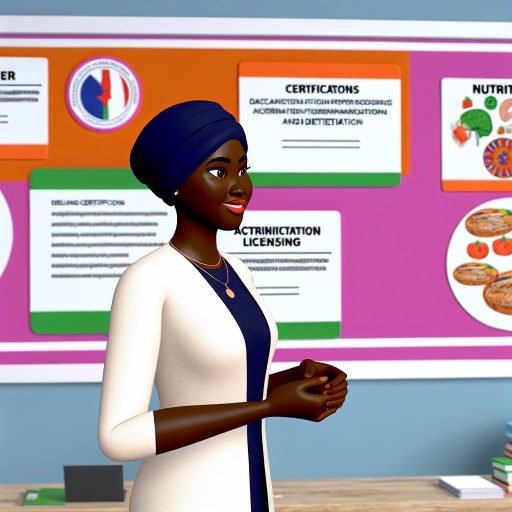Introduction:
Brief overview of what medical biochemistry is: Medical biochemistry is the study of biochemical processes within the human body, focusing on how chemicals and molecules interact.
Importance of studying medical biochemistry in Nigerian schools: Understanding medical biochemistry is crucial for healthcare professionals to diagnose, treat, and prevent diseases effectively.
Current State of Medical Biochemistry Curriculum in Nigerian Schools:
The current medical biochemistry curriculum in Nigerian schools focuses on the study of biochemical processes in health and disease.
Description of the current curriculum:
The current medical biochemistry curriculum in Nigerian schools focuses on the study of biochemical processes in health and disease.
Challenges faced in teaching medical biochemistry in Nigerian schools:
- Lack of updated teaching materials and resources.
- Limited practical sessions due to inadequate laboratory facilities.
- Insufficient qualified instructors to teach complex biochemical concepts.
Comparison with international standards:
- Nigerian curriculum lacks practical-based learning similar to international standards.
- International curricula emphasize hands-on experience and research opportunities.
- Nigerian schools need to align with global trends in biochemistry education for competitiveness.
Recommendations to improve the medical biochemistry curriculum in Nigerian schools:
- Invest in state-of-the-art laboratory equipment for practical sessions.
- Provide regular training for instructors to keep up with emerging biochemistry trends.
- Collaborate with international institutions for knowledge exchange and curriculum enhancement.
Future prospects for medical biochemistry education in Nigeria:
- Strengthening ties with global institutions can elevate the standard of biochemistry education.
- Integration of research opportunities can enhance practical skills of students.
- Continuous curriculum review is essential to meet the evolving demands of the healthcare industry.
List of essential topics covered in the curriculum
- Cellular metabolism
- Protein structure and function
- Enzyme kinetics and regulation
- Carbohydrate metabolism
- Lipid metabolism
- Nucleic acids and gene expression
- Signal transduction pathways
- Biochemical basis of diseases
The medical biochemistry curriculum in Nigerian schools encompasses a wide range of essential topics that are crucial for a thorough understanding of the field.
One of the key areas covered is cellular metabolism, which delves into the various biochemical processes that occur within cells to maintain homeostasis.
Protein structure and function is another important topic that is emphasized in the curriculum.
This area explores the intricate details of how proteins are constructed and how their functions are vital for the proper functioning of biological systems.
Enzyme kinetics and regulation is a fundamental topic that is thoroughly discussed in the curriculum.
Students learn about the catalysts that drive biochemical reactions and how their activity is tightly regulated to maintain metabolic balance.
Carbohydrate and lipid metabolism are also extensively covered in the curriculum.
These topics delve into how the body utilizes carbohydrates and lipids for energy production and the implications of disruptions in these pathways for human health.
Another essential topic in the curriculum is nucleic acids and gene expression.
Students learn about the structure and function of DNA and RNA, as well as the mechanisms by which genetic information is transcribed and translated into proteins.
Signal transduction pathways are crucial in understanding how cells communicate with each other.
This topic explores the intricate signaling cascades that are essential for coordinating cellular responses to various stimuli.
The curriculum also addresses the biochemical basis of diseases.
Students learn how dysregulation of biochemical pathways can lead to the development of various diseases and disorders, providing them with insights into potential therapeutic targets.
Importance of each topic in the field of medicine
- Cellular metabolism: Understanding metabolic processes is crucial for diagnosing and treating metabolic disorders.
- Protein structure and function: Knowledge of proteins is essential for drug design and development in medicine.
- Enzyme kinetics and regulation: Enzymes are key targets for drug therapy, making this topic essential for pharmacology.
- Carbohydrate and lipid metabolism: Imbalances in these pathways can lead to conditions like diabetes and obesity, making this knowledge critical for managing such diseases.
- Nucleic acids and gene expression: Insights into genetic mechanisms are essential for precision medicine and gene therapy.
- Signal transduction pathways: Understanding signaling pathways is crucial for developing targeted therapies for various diseases.
- Biochemical basis of diseases: Knowledge of disease mechanisms at the molecular level is vital for diagnosing and treating illnesses effectively.
Each topic covered in the medical biochemistry curriculum plays a significant role in the field of medicine.
For instance, a thorough understanding of cellular metabolism is essential for diagnosing and treating metabolic disorders that can have serious implications for human health.
Knowledge of protein structure and function is crucial for drug design and development in medicine.
Proteins are key targets for drug therapy, and understanding their structure and function is essential for designing effective medications that can target specific biological pathways.
Enzyme kinetics and regulation are also vital topics in the curriculum, as enzymes are crucial for catalyzing biochemical reactions in the body.
Understanding how enzymes function and how their activity is regulated is essential for pharmacology, as many drugs target enzymes to modulate specific pathways in the body.
Carbohydrate and lipid metabolism are important areas of study, as imbalances in these pathways can lead to conditions such as diabetes and obesity.
Healthcare professionals must have a deep understanding of these metabolic processes to effectively manage and treat such diseases.
Knowledge of nucleic acids and gene expression is essential for precision medicine and gene therapy.
Understanding how genes are transcribed and translated into proteins is vital for developing personalized treatment strategies based on an individual’s genetic makeup.
Signal transduction pathways are key to understanding how cells communicate and respond to external stimuli.
This knowledge is critical for developing targeted therapies that can modulate specific signaling pathways to treat various diseases effectively.
Finally, the biochemical basis of diseases is a crucial topic that underscores the importance of understanding disease mechanisms at the molecular level.
By exploring how disruptions in biochemical pathways can lead to various diseases, healthcare professionals can develop more effective diagnostic and treatment strategies to combat these illnesses.
How these topics are taught in Nigerian schools
- Interactive lectures with multimedia aids
- Hands-on laboratory experiments
- Case studies and problem-solving exercises
- Guest lectures from medical professionals
- Field trips to research institutions
- Integration with clinical training
The topics covered in the medical biochemistry curriculum are taught in Nigerian schools through a variety of methods that aim to provide students with a comprehensive understanding of the subject matter.
Interactive lectures with multimedia aids are commonly used to engage students and enhance their understanding of complex biochemical processes.
Hands-on laboratory experiments are an integral part of the curriculum, allowing students to apply theoretical knowledge to practical situations.
By performing experiments, students develop essential laboratory skills and gain a deeper insight into the principles of biochemistry.
Case studies and problem-solving exercises are also used to challenge students to think critically and apply their knowledge to real-world scenarios.
By analyzing case studies and solving problems, students develop problem-solving skills and learn how to apply biochemical principles in clinical settings.
Guest lectures from medical professionals are often organized to provide students with insights into the practical applications of biochemistry in the field of medicine.
These lectures offer students the opportunity to interact with experts in the field and gain valuable perspectives on how biochemistry is utilized in clinical practice.
Transform Your Career with Expert Guidance
Get personalized mentorship consulting that’s tailored to your unique path. Our expert advice is actionable and exclusive.
Get StartedField trips to research institutions are organized to expose students to cutting-edge research in biochemistry and medical science.
By visiting research facilities, students gain firsthand experience of the latest advancements in the field and understand how biochemistry is applied in research settings.
Lastly, the medical biochemistry curriculum in Nigerian schools is integrated with clinical training to provide students with a holistic understanding of the subject.
By blending theoretical knowledge with practical clinical experience, students develop the skills and competencies needed to excel in the field of medicine.
Explore Further: Radiology Licensure and Certification in Nigeria
3. Practical Components of Medical Biochemistry Curriculum:
Overview of laboratory sessions and practical exercises
Importance of hands-on experience in understanding biochemistry concepts
Availability of resources for practical sessions in Nigerian schools
When it comes to the practical components of the medical biochemistry curriculum in Nigerian schools, there are several key aspects to consider.
Laboratory sessions and practical exercises play a crucial role in enhancing students’ understanding of theoretical concepts.
Hands-on experience is essential in bridging the gap between theory and practice.
It allows students to apply their knowledge in real-life situations, thereby deepening their understanding of complex biochemistry principles.
In Nigerian schools, the availability of resources for practical sessions can sometimes be a challenge.
Limited funding and inadequate equipment can hinder the effectiveness of practical exercises, impacting students’ overall learning experience.
Despite these challenges, educators strive to create engaging and interactive practical sessions that maximize the available resources.
Hands-on experiments, demonstrations, and group activities are utilized to ensure that students receive a well-rounded biochemistry education.
Furthermore, collaborative efforts between schools, government agencies, and private organizations can help alleviate resource constraints and enhance the quality of practical sessions.
By pooling resources and sharing expertise, educators can create a more enriching learning environment for students.
Overall, the practical components of the medical biochemistry curriculum in Nigerian schools play a vital role in shaping students’ understanding of biochemistry concepts.
By emphasizing hands-on experience and optimizing available resources, educators can create a more dynamic and engaging learning experience for students.
See Related Content: Public Awareness Campaigns on Nutrition in Nigeria
Faculty Qualifications and Training:
Qualifications required to teach medical biochemistry.
Training programs available for faculty members.
Importance of having well-trained educators in the field.
Qualifications required to teach medical biochemistry
Faculty members teaching medical biochemistry in Nigerian schools are required to have a minimum of a Master’s degree in Biochemistry or a related field.
Some institutions may prefer candidates with a Ph.D. in the field for higher-level teaching positions.
In addition to academic qualifications, educators must have practical experience in the field of medical biochemistry.
This experience helps provide students with real-world insights and applications.
Training programs available for faculty members
There are various training programs available for faculty members teaching medical biochemistry in Nigerian schools.
These programs focus on enhancing teaching skills, updating knowledge on the latest research, and advancements in the field.
Faculty members are encouraged to participate in workshops, conferences, and continuous education programs.
These opportunities help them stay current and deliver quality education to their students.
Importance of having well-trained educators in the field
Having well-trained educators in the field of medical biochemistry is crucial for ensuring the quality of education provided to students.
Well-trained faculty members possess the necessary expertise, skills, and knowledge to effectively teach complex concepts.
They can conduct research and mentor students effectively.
Their experience and qualifications contribute to the overall academic excellence of the institution.
Additionally, well-trained educators can inspire and motivate students to pursue careers in the field.
This leads to a future generation of skilled professionals in the healthcare industry.
Find Out More: Nursing Science Research Opportunities in Nigeria

Student Engagement and Learning Outcomes:
Engaging students in medical biochemistry classes is crucial for their understanding and retention of the course material.
Here are strategies used to promote student engagement:
- Interactive lectures that encourage student participation through discussions and Q&A sessions.
- Hands-on laboratory experiments that allow students to apply theoretical concepts in a practical setting.
- Group projects and presentations that foster teamwork and collaboration among students.
- Use of multimedia tools such as videos and animations to enhance students’ visual learning experience.
Assessment methods play a significant role in measuring students’ learning outcomes in medical biochemistry.
These methods include:
- Regular quizzes and tests to gauge students’ understanding of key concepts.
- Mid-term and final exams that assess students’ overall knowledge of the subject.
- Practical assessments in the form of lab reports and experiments to evaluate students’ lab skills.
- Research papers or projects that require students to delve deeper into specific topics.
The impact of the medical biochemistry curriculum on students’ future careers in medicine is substantial.
By mastering the fundamental principles of biochemistry, students are better equipped to:
- Understand the biochemical basis of diseases and their treatments, enhancing their diagnostic skills as future healthcare professionals.
- Effectively communicate with other healthcare practitioners and researchers, facilitating interdisciplinary collaborations.
- Conduct research in biochemistry and related fields, contributing to advancements in medical science and technology.
- Pursue specialized medical fields such as pharmacology, genetics, or clinical biochemistry based on their interests and expertise.
Student engagement strategies, effective assessment methods, and the curriculum’s impact on students’ future careers in medicine are integral aspects of the medical biochemistry curriculum in Nigerian schools.
Discover More: Nursing Science Student Life in Nigerian Universities
Collaboration with Medical Institutions and Research Centers:
Students in Nigerian schools studying medical biochemistry have the unique opportunity to collaborate with various medical institutions.
This collaboration allows students to gain valuable hands-on experience in real-world healthcare settings.
Opportunities for students to collaborate with medical institutions:
These opportunities expose students to cutting-edge research in the field of biochemistry.
Research projects and internships available to students:
Medical biochemistry students can participate in research projects and internships that provide them with practical skills and knowledge.
Benefits of these collaborations for students’ education:
Collaborating with medical institutions and research centers offers numerous benefits for students’ education.
Students gain a deeper understanding of medical biochemistry by applying their theoretical knowledge to real-world scenarios.
Additionally, they develop critical thinking, problem-solving, and communication skills that are essential for success in the field.
Enhancing Medical Biochemistry Education in Nigeria
The current state of the medical biochemistry curriculum in Nigerian schools is lacking in depth and relevance to modern healthcare practices.
Key points include outdated content, inadequate practical training, and limited emphasis on research skills.
Improving and updating the medical biochemistry curriculum is crucial.
Doing so ensures that students are equipped with the necessary knowledge and skills to meet the demands of today’s healthcare landscape.
By enhancing the curriculum, educational institutions can better prepare students for their future careers.
We urge policymakers and educational institutions to act on improving the medical biochemistry curriculum.
This can be achieved by incorporating the latest advancements, practical training opportunities, and emphasizing research skills.
Ensuring these changes will prepare the next generation of healthcare professionals in Nigeria.




